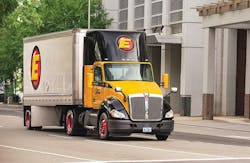Estes Express Adds 12 EV Trucks to Fleet and Installs 2 Rooftop Solar Projects at Terminals
Estes Express Lines, a privately-owned North American freight carrier, announced it has added its first zero-emission Class 8 trucks to its California fleet and installed two rooftop solar photovoltaic projects at its terminals in New Jersey.
The 12 Freightliner eCascadia trucks will be introduced to the company’s terminal in Banning, California, and each truck can travel approximately 230 miles on a single charge – making them the ideal sustainable solution for local pickup and delivery assignments.
The Banning facility currently has an on-site charging infrastructure, and the 12 new e-trucks will join its existing electric fleet, which includes 300 electric forklifts and two electric yard jockeys.
“At Estes, we seek out opportunities to test and incorporate equipment that will help us reduce our carbon footprint. We’re thrilled to begin introducing electric trucks into our fleet and look forward to adding more as availability and infrastructure allows,” said Sara Graf, Vice President of Sustainability, Culture, and Communications at Estes.
In partnership with Dynamic Energy Solutions, Estes has also completed two rooftop solar PV installations at its terminals in Lakewood and Pine Brook, New Jersey.
The two projects are projected to offset nearly 100% of the facilities’ energy demands, and over the projects’ 25-year lifespans, the installations are projected to save over $1 million in energy savings and future energy costs.
“The freight industry is incredibly energy intensive, and efforts like this help Estes offset expenses in this area while furthering our investment in clean, sustainable energy sources,” said Webb Estes, President and COO of Estes.
The two New Jersey installations represent the fourth and fifth solar projects completed by Estes at its North American terminals. In addition, Estes is currently adding two other solar installation projects to its Norfolk, Virginia, and Joliet, Illinois, locations.
Once all projects are completed, Estes will boast a portfolio of 2.4 MW, which is expected to generate approximately 1,677,000 kWh annually – enough to offset nearly 1,180 metric tons of carbon dioxide each year.
About the Author
Breanna Sandridge, Senior Editor
Breanna Sandridge is senior editor for EnergyTech and Microgrid Knowledge, both part of the energy group at Endeavor Business Media.
Prior to that, Breanna was managing editor for Machinery Lubrication and Reliable Plant magazines, both part of Noria Corp. She has two years experience covering the industrial sector.
She also is a 2021 graduate of Northeastern State University (Oklahoma) with a Bachelor's in English.
